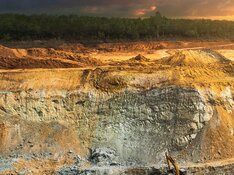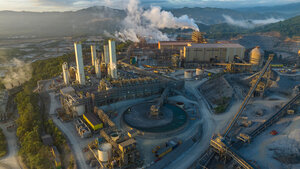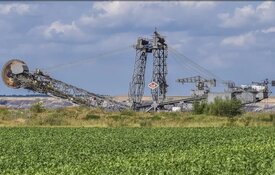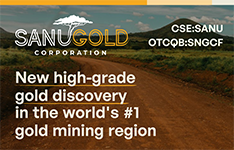Hercules Metals Corp. (BADEF:OTCMKTS; BIG:TSXV) announced significant findings from its Phase I metallurgical testing at the Hercules Project in western Idaho. The testing, conducted by Forte Dynamics, analyzed four composite samples weighing over 50 kilograms each, including oxide and sulfide silver from the near-surface epithermal system and copper from the underlying porphyry system. The initial open cycle tests demonstrated copper recoveries of 87%, with locked cycle testing projected to reach 90%. For silver, a two-step leaching process achieved recoveries of 86% for oxide mineralization and 82% for sulfide mineralization. These results reflect an improvement of over 20% compared to historical recoveries from similar material.
Chris Paul, CEO of Hercules Metals, noted that the recovery values exceeded expectations in the news release, "These initial recovery values exceeded our expectations and highlight that a commercial-grade clean concentrate can be produced without deleterious elements like arsenic or antimony. Moving forward, we anticipate that future optimization studies will work to further enhance these strong initial numbers from our phase I study. Perhaps most encouraging are the exceptionally strong silver recoveries achieved on the near-surface epithermal mineralization. By developing a simple two-step leaching process, Deepak and his team at Forte have improved on historical recoveries by over 20%. This alone may have a profound impact on the future development of the Property, as the ability to implement low-cost leaching of the near surface silver mineralization not only enhances its viability, but also strongly positions us to unlock the underlying porphyry system."
The testing incorporated a sulfurous acid leach, which liberated silver bound to manganese minerals, followed by cyanidation to extract the remaining silver. For copper and molybdenum, flotation tests revealed high recoveries, with 95% of copper and 84% of molybdenum recovered in the rougher concentrate during 12-minute flotation cycles. Cleaner flotation tests projected a copper concentrate grade of 24%, indicating the ability to produce marketable materials.
The results mark an important milestone in understanding the resource potential at the Hercules Project. Ongoing and future testing aims to optimize the recovery processes for both metals.
Why Critical Metals?
According to Silverwars.com, on November 30, the global silver shortage persisted as a significant challenge for industries reliant on this critical metal. Highlighting its importance, the publication noted that silver holds the highest electrical and thermal conductivity and reflectivity among all metals, making it indispensable in modern defense and technology applications. This aligns with a 2023 statement by the Hunan Geological Survey, which described silver as an "indispensable" material for cutting-edge technological development.
Jeff Clark of The Gold Advisor maintained an "overweight allocation" in Hercules Metals, suggesting a strong belief in the company's potential, and encouraged investors to "invest accordingly, especially while shares are down."
On December 3, Mining.com detailed the intertwined copper trade among the United States, Canada, and Mexico, emphasizing copper's critical role in industries such as automotive manufacturing.
It was reported that disruptions in copper supply could significantly impact downstream industries due to the material's widespread applications.
U.S. copper imports were noted to total 767,000 metric tons in 2023, with Chile, Canada, and Peru as key suppliers. Despite potential tariff implications, the article suggested that domestic production could receive a boost with appropriate incentives.
In an article from Grist.com on the same date, the publication looked at the essential role of copper in advancing the global energy transition. The clean energy sector's demand for copper was projected to nearly triple by 2040, driven by the need for its use in renewable energy technologies, including wind turbines, solar panels, and electric vehicles. The publication noted that copper miners have increasingly encountered lower-grade ores, necessitating innovative extraction methods. Emerging technologies, such as heap leaching and electrochemical reductive leaching, were highlighted as potential solutions for more sustainable and efficient copper recovery. These advancements aimed to reduce the industry's environmental footprint while meeting surging demand.
The Forces Driving Hercules
Hercules Metals identified several upcoming steps to build on the strong results from its Phase I testing. According to the company's investor presentation, the next steps include refining the two-step leaching process for silver and improving locked cycle flotation for copper recovery. Additional analysis of copper-molybdenum separation is planned, which could enhance the quality and marketability of the concentrates.
The project also benefits from its location in Idaho, a jurisdiction with low geopolitical risk, infrastructure support, and hydroelectric power, which reduces operational costs. A planned Phase IV drill program is expected to resume in 2025, with the goal of further expanding the known mineralized zones and testing additional targets identified in earlier phases of exploration.
Hercules Metals has positioned itself to leverage these metallurgical advancements to drive exploration and development efforts, ensuring the project aligns with its long-term objectives.
What Analysts Are Saying About Hercules Metals
According to Jeff Clark of The Gold Advisor, on December 3, 2024, Hercules Metals achieved recovery rates exceeding industry averages in their first phase of metallurgical testing at the Hercules Project. Copper recoveries were reported at ±87%, with projections for locked cycle testing to reach ±90%, while silver recoveries were 86% for oxide mineralization and 82% for sulfide mineralization. The publication highlighted that these results surpass the average industry recovery rates of approximately 75% for copper and 78% for silver.
 Streetwise Ownership Overview*
Streetwise Ownership Overview*
Hercules Metals Corp. (BADEF:OTCMKTS;BIG:TSXV)
Jeff Clark stated, "This helps demonstrate strong economics for the deposit, which will attract majors to the asset." He noted that the testing was conducted by Dr. Deepak Malhotra of Forte Dynamics, a well-regarded metallurgist with extensive experience in large silver deposits.
Clark also maintained an "overweight allocation" in Hercules Metals, suggesting a strong belief in the company's potential, and encouraged investors to "invest accordingly, especially while shares are down."
Ownership and Share Structure
According to Refinitiv, 3.97% of Hercules Metals is owned by Institutions. Of those, Jupiter Asset Management Ltd owns the most with 2.76%, Crescat Capital owns 1.07%.
Strategic investor, Barrick Gold Corp., owns 13.26%.
Management and Insiders hold 4.55%. CEO Chris Paul holds the most with 3.46% and Director Peter Simeon holds 1.07%.
Hercules Metals has a market cap of US$139.042M and a 52 week range of US$0.4600 - 1.6200.
| Want to be the first to know about interesting Critical Metals investment ideas? Sign up to receive the FREE Streetwise Reports' newsletter. | Subscribe |
Important Disclosures:
1) James Guttman wrote this article for Streetwise Reports LLC and provides services to Streetwise Reports as an employee.
2) This article does not constitute investment advice and is not a solicitation for any investment. Streetwise Reports does not render general or specific investment advice and the information on Streetwise Reports should not be considered a recommendation to buy or sell any security. Each reader is encouraged to consult with his or her personal financial adviser and perform their own comprehensive investment research. By opening this page, each reader accepts and agrees to Streetwise Reports' terms of use and full legal disclaimer. Streetwise Reports does not endorse or recommend the business, products, services or securities of any company.
For additional disclosures, please click here.










































